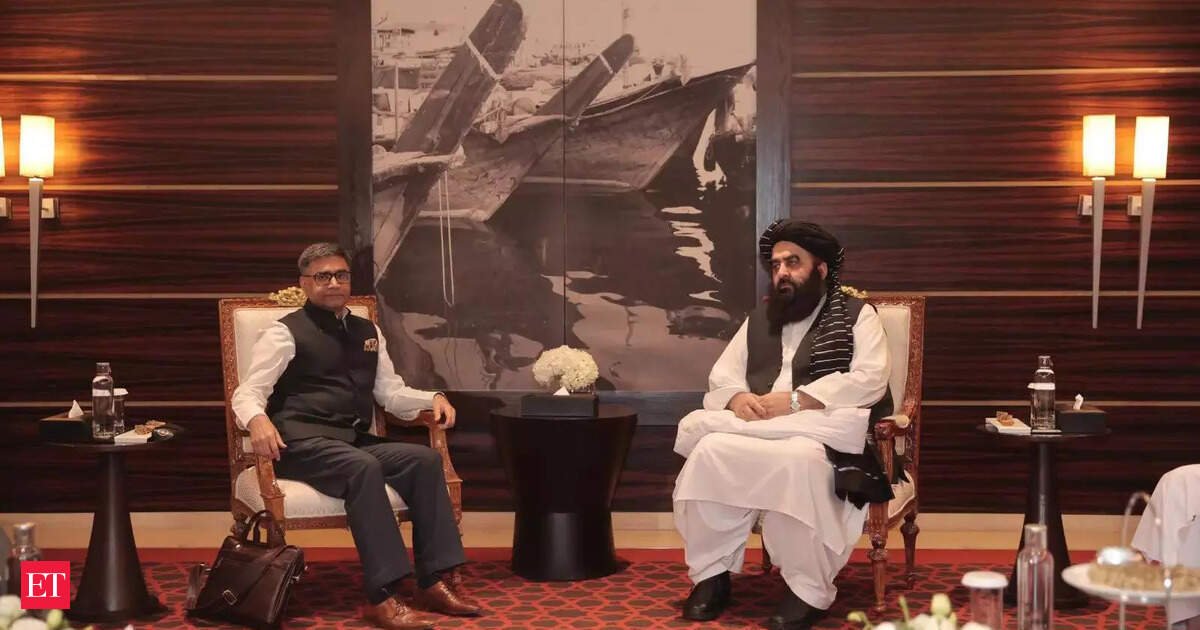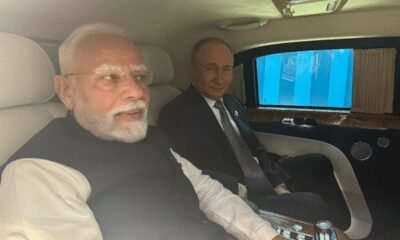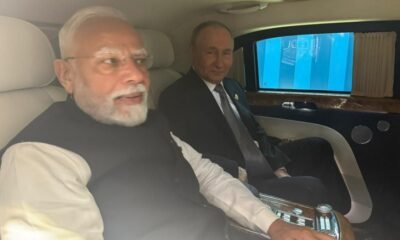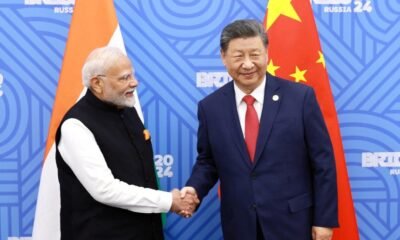Travel Guides & Articles
S Jaishankar to meet Russian counterpart in Moscow after China foreign min’s India visit | Latest News India

Chinese foreign minister Wang Yi is set to visit India next week for talks on the border issue, days before external affairs minister S Jaishankar travels to Moscow for a trade and economic dialogue with his counterpart Sergey Lavrov, with both meetings crucial for New Delhi’s ties with Beijing and Moscow amid strains in the relationship with Washington.
Wang is expected to be in New Delhi on August 18 for talks with National Security Adviser Ajit Doval under the mechanism of Special Representatives for the border issue, people familiar with the matter said on condition of anonymity. This will be a follow-up to Doval’s trip to Beijing last December and part of preparations for Prime Minister Narendra Modi’s visit to China at the end of this month for the Shanghai Cooperation Organisation (SCO) Summit, they said.
A meeting between Wang and Jaishankar is not being ruled out, the people said. Within days of Wang’s visit, Jaishankar will travel to Moscow during August 21-23 for talks with Lavrov and to co-chair a meeting of the India-Russia Inter-Governmental Commission on Trade, Economic, Scientific, Technological and Cultural Cooperation (IRIGC-TEC), they said.
This is the main mechanism overseeing trade and economic cooperation between the two sides and the meeting will be an opportunity to discuss matters such as the impact of US President Donald Trump’s punitive tariff on India’s purchases of Russian crude, the people said.
The visits by Wang and Jaishankar are yet to be formally announced by China or India, though preparations have been underway for quite some time, the people said. Talks in the Special Representatives format resumed after Modi and President Xi Jinping met in the Russian city of Kazan on October 23 last year – two days after India and China reached an understanding on ending the military standoff on the Line of Actual Control – and agreed to revive several mechanisms to normalise bilateral ties and address the long-festering border dispute.
However, both visits have assumed greater significance in light of a downturn in India-US relations in recent weeks on trade-related issues, primarily due to Trump slapping a tariff on Indian goods and an additional penalty for Russian oil purchases.
The two Special Representatives are expected to consider confidence-building measures to bolster peace and tranquillity in the border areas and to take forward efforts aimed at seeking a mutually acceptable framework for settling the border issue, the people said. At their last meeting in December, Doval and Wang had “resolved to inject more vitality into this process”, according to an Indian readout.
There have been several signs of a thaw in India-China ties following the chill caused by the border face-off, which saw both sides amassing nearly 50,000 troops each in Ladakh sector of LAC. In April, the two sides resumed the Kailash Mansarovar Yatra to the Tibet region after a gap of five years, and this was followed by India resuming tourist visas for Chinese nationals in July.
India and China are also in advanced negotiations on resuming direct flights and trade through selected border posts, and there has been “forward movement” on restrictions imposed by China on fertiliser exports to India.
The Special Representatives are also expected to review cross-border cooperation and data-sharing on cross-border rivers. India’s concerns about China’s construction of what is set to be the world’s largest hydropower dam on the upper reaches of the Brahmaputra river too could figure in the talks, the people said. The Indian side formally raised the construction of the $167-billion dam on Yarlung Tsangpo river in Tibet with China and called for transparency and consultations on the project.
Wang’s meetings in New Delhi will also prepare the grounds for PM Modi’s planned visit to China to participate in the SCO Summit in Tianjin on August 31 and September 1. Modi is expected to hold a bilateral meeting with Xi on the margins of the summit, the people said.
On Wednesday, Russian foreign ministry spokesperson Alexey Fadeev confirmed Jaishankar will hold talks with Lavrov on August 21 before participating in the 26th session of the IRIGC-TEC. The trade and economic dialogue is co-chaired by Jaishankar and Russian first deputy prime minister Denis Manturov, and it was last held in New Delhi in November 2024.
The upcoming dialogue will be an opportunity for India to discuss various trade-related issues, including the current imbalance in trade and greater trade settlement in national currencies in the face of Western sanctions and tariffs, the people said.
India-Russia trade reached a record high of $68.7 billion in FY 2024-25, though Indian exports accounted for only $4.88 billion. India has repeatedly raised issues such as greater access to Russian markets and diversification of trade, which has been dominated by increased uptake of Russian crude in the past three years.
As part of measures to bolster rupee-ruble trade, the Reserve Bank of India on August 5 allowed authorised dealer (AD) category-1 banks to open special rupee vostro accounts for their foreign correspondent banks, and this was followed a week later by the easing of rules to allow funds in these accounts to be invested in government securities and treasury bills.
The meeting of the IRIGC-TEC will be followed by a meeting of the India-Russia Inter-Governmental Commission on Military Technical Cooperation (IRIGC-MTC), for which the Russian defence minister will travel to New Delhi, the people said. The meeting of these bodies is part of preparations for a planned visit to India by President Vladimir Putin for the annual bilateral summit later this year.
Travel Guides & Articles
Spirit Airlines Is Struggling, and Rivals Smell Blood

The airline industry is betting against Spirit Airlines.
Spirit’s biggest aircraft lessor last week told the carrier it was terminating lease agreements for some of its planes, helping tip the struggling discounter into its second bankruptcy in less than a year. Now, rival airlines are getting in position to go after the budget airline’s customers.
United Airlines, whose chief executive has predicted since last year that Spirit would eventually go under, is preparing to backfill the void that would be left if Spirit goes out of business by the end of this year. It is adding flights starting in January from Spirit strongholds such as Las Vegas as well as Orlando and Fort Lauderdale, Fla.
“If Spirit suddenly goes out of business it will be incredibly disruptive, so we’re adding these flights to give their customers other options if they want or need them,” said Patrick Quayle, United’s head of network planning and alliances.
Frontier, which is gunning for Spirit’s position as the largest U.S. ultradiscounter, has seized on Spirit’s pullback, announcing plans to add service along several routes Spirit serves.
“We want to be America’s low-fare airline,” said Frontier Chief Executive Barry Biffle. “And we see an opportunity.”
Spirit, which filed for chapter 11 bankruptcy last week, has assured customers they can continue to book future flights and use their tickets. Chairman Robert Milton said in a recent interview the airline has no intention of liquidating: “It needs its costs restructured and to get its mojo back.”
Spirit for years played the role of an airline industry maverick, charging ultralow fares with fees for almost everything.
A Spirit spokesman on Thursday described United’s plans as “wishful thinking” from an airline that wants to drive a low-cost competitor out of business in order to charge more.
“While we appreciate the obsession certain airline executives have with us, we’re focused on competing and running a great operation,” he said.
But even a weakened Spirit is good news for competitors, which stand to benefit from reduced supply of seats.
In years past, Spirit has played the role of an industry maverick. It was willing to fly its bright yellow planes into big cities and go head-to-head with the legacy airlines. Its nickel-and-dime approach to sales—charging bargain basement fares with fees for almost everything—sometimes annoyed customers. But it also forced competitors to lower fares, and in many cases, adopt similar practices.
Now Spirit plans to shrink its fleet and retrench to key cities such as Orlando, Fort Lauderdale and Detroit. It announced this week that it is pulling out of 11 cities and scrapping plans to add service to one more—about 4.5% of its planned flights.
A three-year saga of failed mergers, changing postpandemic travel patterns, and new competitive weapons deployed by big airlines brought Spirit to this point. Spirit’s losses since the beginning of 2020 have more than wiped out all the profits it made since 2006, when it shifted to embrace the ultradiscount model.
Struggling to find its footing after a federal judge last year struck down a $3.8 billion acquisition by JetBlue Airways, Spirit filed for its first bankruptcy in November. But it didn’t seek to use the power of chapter 11 to renegotiate contracts with aircraft lessors or other obligations, as other airlines have historically done after filing for bankruptcy.
The company opted instead for a quick balance-sheet fix that minimized its time spent under court protection, hoping to avoid a lengthy and expensive process. The earlier bankruptcy only affected Spirit bondholders, which swapped nearly $800 million in debt for equity ownership of the business, while leaving more than $2 billion of debt outstanding.
Spirit recently said it is pulling out of 11 cities and scrapping plans to add service to one more.
“Unfortunately, the industry-wide headwinds that preceded the Prior Chapter 11 Cases did not abate; rather, they intensified,” Chief Financial Officer Fred Cromer wrote in a court filing over the weekend. Instead of the $252 million in profit Spirit had projected for 2025, it reported in August that it had lost more than $256 million since mid-March.
Spirit had started to warn of its dire straits last month and was scrambling to bolster its cash balances. It drew down $275 million on its revolving credit facility and completed a series of sale-leaseback transactions in July and August that brought in approximately $250 million.
Then last week, AerCap, Spirit’s largest lessor, notified the carrier it was terminating leases for 36 planes scheduled for delivery in the coming years, and said Spirit was also in default on more than three dozen planes already in its fleet.
Worried that the disclosure of the notices would panic other creditors, the airline decided it had no choice but to file for chapter 11 bankruptcy protection again.
Spirit denied that it had defaulted on any of the leases. It said it is negotiating with AerCap to resolve the issue and is prepared to litigate the matter. An AerCap representative didn’t respond to requests for comment.
The company is burning through cash fast. Spirit disclosed a projection showing that it expects to burn $179 million for the first month of the bankruptcy case. Cromer said in court papers that the airline is continuing to work with certain bondholders on an agreement that would allow access to “significant additional liquidity.”
Spirit has said this time will be different.
In a bankruptcy court appearance Tuesday, Spirit lawyer Marshall Huebner characterized the recent filing as “really Spirit’s first chapter 11, not its second.” Spirit intends to use the powers of the bankruptcy code to walk away from certain contracts, shrink its aircraft fleet and reduce its operating costs, Huebner said in court.
Once the process is complete, “Spirit will once again be the disruptive maverick that has long challenged—and changed—the U.S. aviation industry,” Cromer wrote.
Write to Alison Sider at alison.sider@wsj.com and Alexander Gladstone at alexander.gladstone@wsj.com
Travel Guides & Articles
Sonali Phogat murder: Court allows 2nd accused to travel abroad for wife’s birthday

The Goa trial court has allowed Sukhwinder Singh, the second accused in the murder of BJP leader and social media influencer Sonali Phogat, to travel abroad to celebrate his wife’s birthday.
The court allowed Singh’s application, but directed him to return to India and be present for the next date of the trial — September 24.
Singh, who was the first accused to have been granted bail, was earlier directed by the court to surrender his passport before the Central Bureau of Investigation (CBI), which is investigating the case and not to travel abroad as one of the conditions of his bail.
Last month Singh had sought permission from the Panaji district and sessions court to travel to Indonesia for two weeks while also undertaking to return back to India by September 23, the day before the next date of hearing.
“In view of the itinerary given by accused No 2, I am of the opinion that permission can be granted to the accused No 2 to travel abroad,” sessions judge Irshad Aga, said.
Singh along with prime accused Sudhir Pal Sangvan are accused in the murder of the BJP leader on August 22. Phogat, died allegedly due to an overdose of an “obnoxious chemical” suspected to be MDMA that was allegedly mixed with a drink and forcibly given to her during an evening out at a nightclub at Anjuna in north Goa.
The case was initially registered as an “unnatural death” after she was declared dead at the St Anthony’s Hospital at Anjuna in Goa, but subsequently registered as murder based on a complaint filed by her brother Rinku Dhaka, who accused Sudhir Sangvan, the prime accused, who was also her personal assistant of being responsible for her death.
Following an uproar, the case was handed over to the CBI.
Earlier, on account of the trial being prolonged, the court had allowed both the accused to travel outside the state (Goa) and visit their native place in Haryana and relaxed the bail condition that stated they were not to leave the state.
Singh submitted that he and his wife intend to travel to Kuta from September 9 to September 13. From Kuta, they will travel to Canggu for four days till September 17 and thereafter, they will travel by road to Uluwatu and stay there till September 22. The accused submitted that they will return to India on September 23.
Travel Guides & Articles
Afghan foreign minister Amir Khan Muttaqi’s India visit called off

The visit was postponed after he could not get a waiver for the trip, they said.
If the visit had taken place, then it would have been the first ministerial visit from Kabul to India after the Taliban seized power in Afghanistan in August 2021.
The UN Security Council had slapped sanctions against all the leading Taliban leaders and they need to secure a waiver for foreign travels.
External Affairs Ministry spokesperson Randhir Jaiswal, when asked at his weekly media briefing about reports of Muttaqi’s proposed visit to India, did not give a direct reply.
“As you are aware, we have longstanding ties with the people of Afghanistan. India continues to support the aspirations and developmental needs of the Afghan people,” he said.”We continue to have engagements with Afghan authorities. If there is an update on this account, we will share it with you,” he said.External Affairs Minister S Jaishankar had phone conversation with Muttaqi on May 15. It was the highest level of contact between New Delhi and Kabul since the Taliban came to power.
India has not yet recognised the Taliban set up and has been pitching for the formation of a truly inclusive government in Kabul.
New Delhi has also been insisting that Afghan soil must not be used for any terrorist activities against any country.
-

 Business1 week ago
Business1 week agoThe Guardian view on Trump and the Fed: independence is no substitute for accountability | Editorial
-
Tools & Platforms4 weeks ago
Building Trust in Military AI Starts with Opening the Black Box – War on the Rocks
-

 Ethics & Policy1 month ago
Ethics & Policy1 month agoSDAIA Supports Saudi Arabia’s Leadership in Shaping Global AI Ethics, Policy, and Research – وكالة الأنباء السعودية
-

 Events & Conferences4 months ago
Events & Conferences4 months agoJourney to 1000 models: Scaling Instagram’s recommendation system
-

 Jobs & Careers2 months ago
Jobs & Careers2 months agoMumbai-based Perplexity Alternative Has 60k+ Users Without Funding
-

 Education2 months ago
Education2 months agoVEX Robotics launches AI-powered classroom robotics system
-

 Podcasts & Talks2 months ago
Podcasts & Talks2 months agoHappy 4th of July! 🎆 Made with Veo 3 in Gemini
-

 Funding & Business2 months ago
Funding & Business2 months agoKayak and Expedia race to build AI travel agents that turn social posts into itineraries
-

 Education2 months ago
Education2 months agoMacron says UK and France have duty to tackle illegal migration ‘with humanity, solidarity and firmness’ – UK politics live | Politics
-

 Podcasts & Talks2 months ago
Podcasts & Talks2 months agoOpenAI 🤝 @teamganassi





















